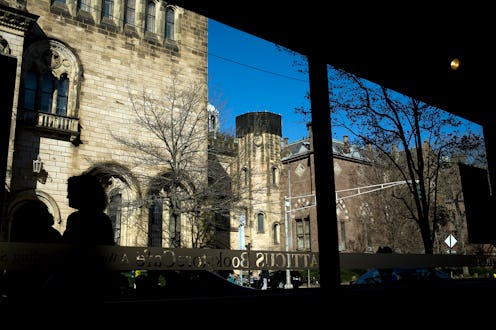Life
Yale's Most Popular Class In 316 Years Is A Course That Teaches You How To Be Happy

There are a lot of great things about college, like new friends, relative freedom, stimulating classes, and late-night pancakes at the dining hall. But it can also be a pretty anxiety-inducing time, and in 2015, 30 percent of college students reported experiencing stress significant enough to affect their performance at school. So it should come as no surprise, then, that Yale's new psychology class on living a happier, more satisfying life is the most popular on campus — so popular, in fact, that about a fourth of the school's undergraduates are signed up this semester. That's a lot of finals to grade.
According to the New York Times, 1,200 students are taking psychology professor Laurie Santos's Psyc 157 class, dubbed Psychology and the Good Life. Santos, who is also head of Yale's residential Silliman College and earned her PhD at Harvard University, focuses on positive psychology, which digs into how people deal can use meaning, joy, flow, and optimism to live happier, more satisfying, and more fulfilling lives. Santos believes the class, which is in its first semester, is so popular because students at competitive universities like Yale have been long taught to prioritize hard work over personal satisfaction, and that's taken a toll on their mental health.
"Students want to change, to be happier themselves, and to change the culture here on campus,” she told the New York Times. “With one in four students at Yale taking it, if we see good habits, things like students showing more gratitude, procrastinating less, increasing social connections, we’re actually seeding change in the school’s culture.”
It appears the students concur — though some admitted to the Times that they wanted to take the class to get an easy A, others say they hope the course, now the most popular in Yale's history, will help them cope with current and future stressors. "In reality, a lot of us are anxious, stressed, unhappy, numb,” freshman Alannah Maynez told the New York Times. “The fact that a class like this has such large interest speaks to how tired students are of numbing their emotions — both positive and negative — so they can focus on their work, the next step, the next accomplishment.”
More than a hundred universities have started adding courses on positive psychology to their catalogues, like the University of Pennsylvania, Claremont Graduate University, and Harvard University, whose undergraduate positive psychology class was also the most popular on campus when it debuted over a decade ago. ''Positive Psych may be the one class at Harvard that every student needs to take," Nancy Cheng, a member of Harvard's class of 2007, told the Boston Globe in 2006. ''In this fast-paced, competitive environment, it is especially crucial that people take time to stop and breathe. A self-help class? Maybe. . . . But from what I've seen and experienced at Harvard, I think we could all use a little self-help like this."
I took a positive psychology course in my junior year of college. Admittedly, I initially thought it would just be an easy social science credit, since I heard there were days in which the class let out early so people could do things they enjoy and document the experience in journals. Instead, I learned the importance of savoring moments of contentment. I learned why ignoring short-term happiness in favor of potential long-term success doesn't work. I learned why optimists are more successful in most fields (except, for some reason, in trial law), and I learned the importance of achieving "flow," i.e. being engaged in work, play, or other activities in a way that is both satisfying and productive because it matches your skills and abilities with the task at hand.
The class was also not easy and I only got a B+, but at least I learned through it that grades don't really mean much in the long run.